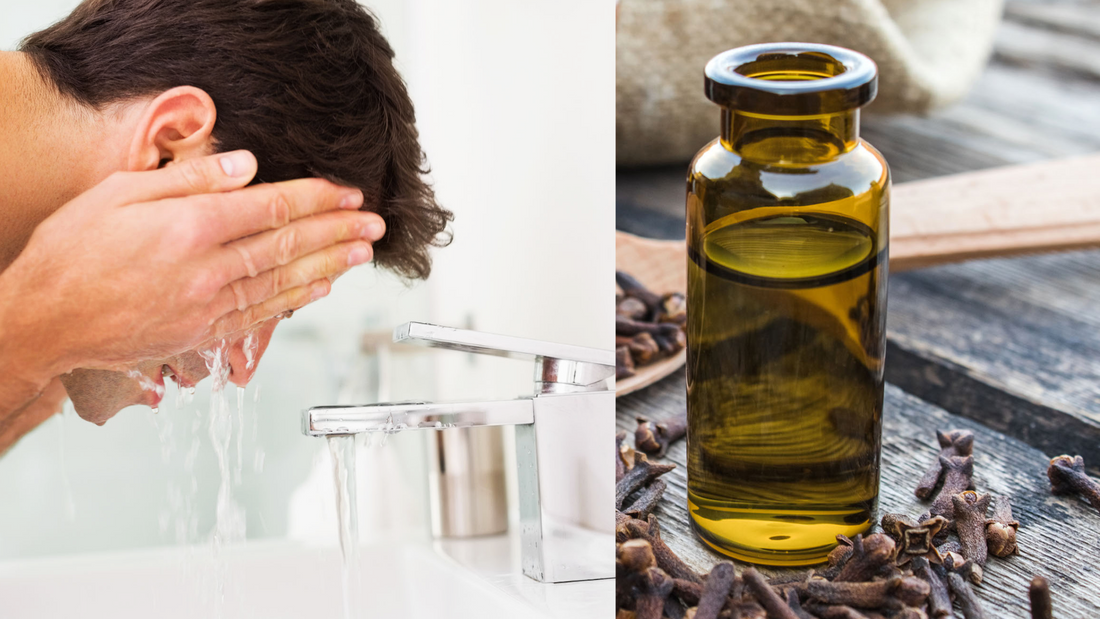
Clove Oil For Acne
Share
We all know cloves smell great, but did you know they can be helpful in fighting acne? Clove Oil is derived from dried clove buds and is often used in oils for aromatherapy. Yet, those of us in the natural beauty space prize clove oil for a different reason: It has anti-inflammatory properties. These properties can reduce redness and diminish the prominence of pimples and blackheads.
The Cause
Acne is caused by impurities in the skin, such as bacteria or dead skin, becoming trapped among healthy skin. Your body surrounds this impurity with sebum (skin oil) to protect itself, and all of this is happening underneath your skin. That impurity and its sebum cause the skin to raise and turn red. This is inflammation. You'll need to know a little about what causes acne in order to understand how clove oil can help.
Cloves Help
Clove oil battles inflammation caused by acne mainly through its eugenol content. Eugenol is a strong, natural analgesic (pain reliever) and antiseptic. It is used in mouthwash for daily hygiene and by dentists to cleanse the mouth prior to treatment. The antiseptic properties of clove oil aid in the battle against bacteria, fungi and other impurities which cause acne. The analgesic benefits aid in the healing and repair of skin damaged by acne.
Clove oil has been used as an anesthetic to treat wounds, burns, and infections. Clove oil has a strong antibacterial effect. Clove oil is used to treat skin diseases and ulcers.
Clove oil is a compound of the essential oil of the plant clove (clove bud), and it is used for all sorts of medicinal purposes. It contains various chemical compounds such as salicylate, lauric acid, caryophyllene, sesquiterpene lactones, phenolic acids and alcohols. Cloves are also known as the "sacred herbs" because they were considered sacred by the ancient Egyptians.
Clove oil has been used since ancient times in various ways as an analgesic, antibacterial agent, ointment and topical cream for wounds or skin diseases. The most common use for cloves was in aromatherapy products that worked with incense or perfumes to relieve pain or inflammation caused by infections or in cases of sunburns caused by overexposure to sunlight. In Europe, cloves were also used in medicinal preparations such as astringents (saltpeter), lipoacetic acid (lauric acid) and astringent ointments (antiseptic).
Study it Out
The antioxidant properties of clove oil are being studied as we speak, there is some evidence it helps shield your body from toxins and free radicals. Other studies show skin benefits can be seen with internal use of cloves. Additionally, there are studies demonstrating positive effects on cardiovascular health after taking clove oil. Yet, we would recommend speaking with a physician prior to ingesting Cloves. Too much can be toxic and everything you ingest will at some point meet your liver. Speaking of liver...
Liver Health Benefits Of Cloves
Cloves contain antioxidants and have been shown to reduce inflammation, promote liver health, increase HDL (good) cholesterol, and lower triglycerides. These benefits are important for your liver health and can be used to treat certain liver ailments such as cirrhosis or hepatitis B/C. In addition, clove oil has been shown to support healthy blood sugar levels and has been shown to improve insulin sensitivity by increasing insulin receptors in the pancreas.
The Benefits Of Cloves For Liver Health
The Liver is an important organ that controls blood sugar levels along with many other organs that contribute to metabolic syndrome (high blood pressure, high total cholesterol, high triglycerides). The activity of these organs is dependent on the amount of nutrients in your diet. As a result, if you lack essential nutrients such as vitamins B-6 or D-6 (which are needed for normal functioning), it can be difficult for your liver's production of these vital enzymes to occur properly due to lack of nutritional support from your diet.
Using Cloves for DIY Skincare
In order to use cloves for skincare , you need to first soak your cloves for a short period of time in water. This will help to remove the oils from your skin and help to moisturize it. While soaking, it is important to use a good quality carrier oil such as olive oil or coconut oil. This will help to preserve the benefits of these oils and prevent them from being lost during processing.
When using clove oil, you'll want to keep your skin clean by applying an even layer of the oil on your face and neck before applying any additional oils on top of it. You'll also want to make sure that you apply a light layer of the oil over any makeup products that may be present on your face as this will help to prevent any makeup from sticking onto your skin.
After applying the clove oil, be sure to rinse off any excess with warm water after being done with it. If you have oily skin, you may prefer not rinsing off excess product after application as this could lead to premature drying out of the product and give it an even appearance that would make it look greasy rather than hydrated.
Also, you can enjoy the external benefits of clove oil on your skin with great products such as our blissani Naturals Clear Spot Solution. Help clear your skin naturally with the power of clove oil, aloe leaf, and white willow bark extract.
blissani Naturals Clear Spot Solution with Clove Oil:
For Further Research on Natural Acne Ingredients we Recommend:
Further Reading on Clove Oil:
National Library of Medicine: https://www.ncbi.nlm.nih.gov/pmc/articles/PMC3769004/
National Library of Medicine (2): https://www.ncbi.nlm.nih.gov/pmc/articles/PMC5435909/




3 comments
Very interested in leaning to make these
Very interested in leaning to make these
Sebum is skin oil! Not Pus.